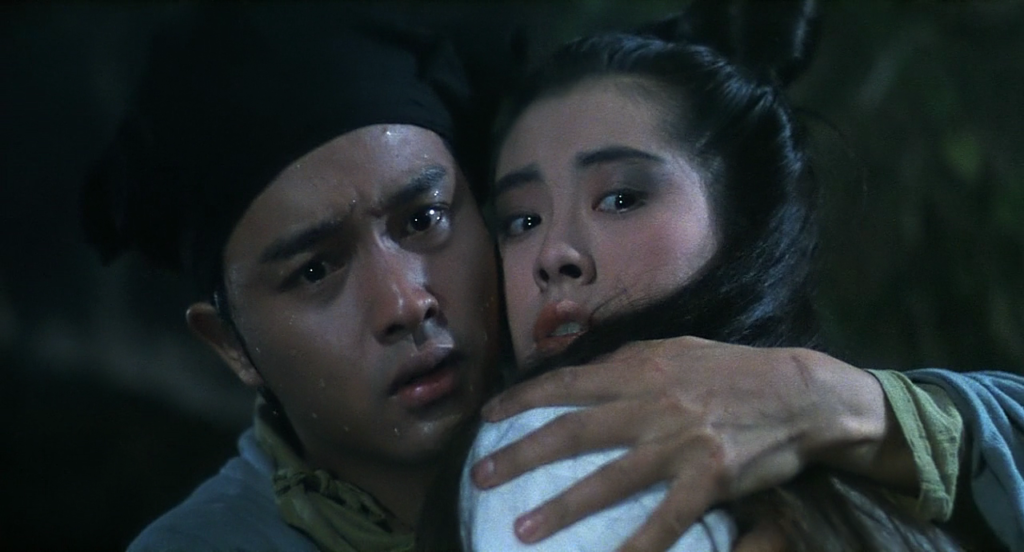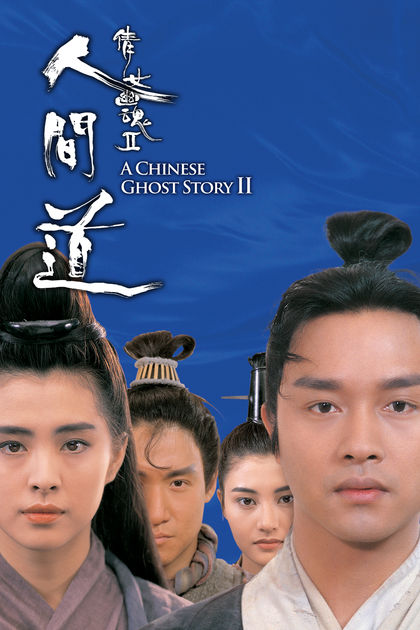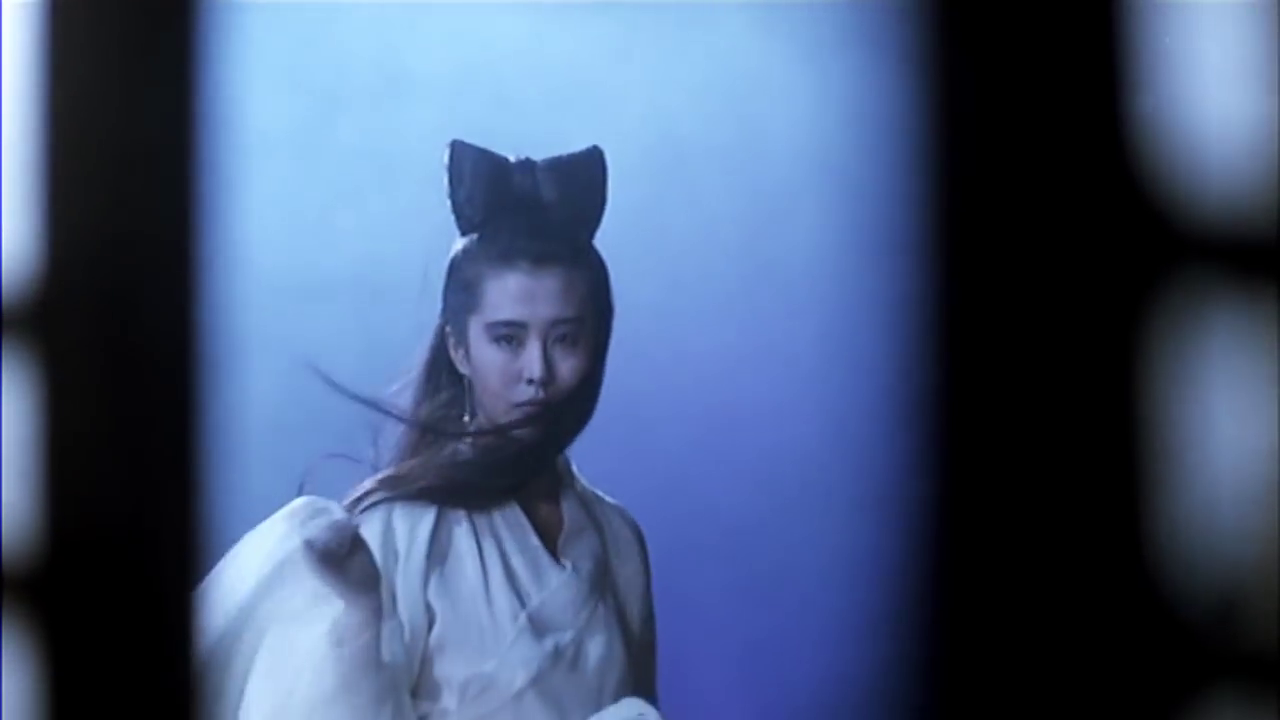Some Chinese Ghost Stories
With ‘Ghost’, Hollywood would seem to have discovered the ability of the dead to be big box-office, but film-makers in Hong Kong have been aware of this for far longer, and regularly produce interesting and exciting films.
The dead in Oriental mythology seem to be much like the living, and there lies the problem. Because you can hardly distinguish between ghosts and real people, until the former start showing off their powers, it’s very easy to make the mistake of, say, falling in love with a ghost and this can cause no end of difficulties. Breaking up with a vengeful girl is bad enough, but when she possesses supernatural powers capable of blowing holes in space and time, things are even more tricky. Cute female ghosts are only part of the population of the underworld. Rather less pleasant are the vampires, usually skilled in martial arts – no Bela Lugosi lookalikes these, they may be recognised by their hopping motion which may seem comic, at least until they start draining your blood…
Fortunately, humans are not defenceless and certain measure are effective: there are phrases which when spoken or written, can provide protection – in extreme cases, these may be written on the skin but great care must be taken to cover the whole body or you will suffer the fate of a character in ‘Kwaidan’, who neglected his ears and had them ripped off as a result.Priests are also of use, though there is little similarity to their Occidental counterparts – these men of the cloth are just as likely to decapitate as exorcise, and are capable of hurling bolts of force from their fingers.
Of all the films of this genre to have come out of the Far East in recent years, one of the best is universally agreed to be ‘A Chinese Ghost Story’. This was produced by Tsui Hark (who was born in Vietnam but studied at the University of Texas before going to Hong Kong), the director of a string of successful movies beginning with ‘The Butterfly Murders’, the proceeds from which were used to set up the Film Workshop production company with his wife. This specializes in films combining traditional and modern elements – stories are often based on Chinese folklore while the camerawork is straight out of the box marked ‘Sam Raimi’.

Director Ching Siu Tung had no formal training, but worked his way up the cinema ladder, beginning as a stuntman, then being given his own action sequences to direct before finally graduating to a fully fledged feature with ‘Duel to the Death’. While there may remain a nagging feeling that Tsui Hark is as much responsible for the final product as Ching Siu Tung was, it’s all totally irrelevant to anyone’s enjoyment!
As you might expect from a film which credits five action choreographers and four cinematographers, it’s both action-packed and visually stunning. The pace gradually accelerates in each fight scene from the first, which is almost standard kung-fu material, to the last, a climactic battle in hell itself which is unlikely to resemble anything you’ve seen in aWestern movie. Gravity rarely seems to operate in the same direction for two successive camera shots, and the editing is absolutely lightning-fast – fifty or sixty cuts per minute is not uncommon. All of this takes place in a curiously indeterminate era, only to be found in the movies – it’s generally historical but with just enough anachronisms to make you wonder.
The story is from a collection of Ming Dynasty tales, which also provided the inspiration for the earlier ‘A Touch of Zen’. A traveller, in the film a tax-collector, spends the night in a disused temple and sees a beautiful girl there. Unsurprisingly (if you’ve read the second paragraph), she turns out to be a spirit and the rest of the movie concerns his struggle to allow her soul to rest in peace. He is helped and hindered by a Taoist priest, an odd bloke with serious sword skills and a tendency to rap Taoist philosophy. He’s played by Wu Ma, a director in his own right – his films include ‘The Dead and the Deadly’. The hero Leslie Cheung, on the other hand, is in ‘real life’ a pop idol with a slightly effeminate image – the local equivalent of Jason Donovan, say. Anyway, if there’s one thing that Hollywood and Hong Kong have in common, it’s their belief in sequels, so it was no surprise to learn of the imminent arrival of:
A Chinese Ghost Story 2 (Ching Siu Tung) – Leslie Cheung, Joey Wang, Jacky Cheung, Wu Ma.
Our heroic tax-collector, Ning Tsai-Shen (Leslie Cheung) is still unable to stay out of trouble for long! His first encounter is with the bounty-hunters seen in the original, who mistake him for a wanted criminal and haul him off to jail despite his protests. He is thrown in beside Elder Chu (Ku Feng), a philosopher and author who has found he has less trouble with the authorities if he just stays in prison. When Tsai-Shen is about to be executed, Chu helps him escape through a tunnel – outside, he steals a horse belonging to Autumn (Jacky Cheung), a Taoist priest who follows using his favourite mode of travel, underground!

The two meet and sort out the confusion at the ill-named Righteous Villa, containing eight coffins, which gives Tsai-Shen bad vibes. Justifiably so, it seems, as a coffin lid starts to move… Tsai-Shen runs into the forest, where ghost-like forms appear, but after Autumn demonstrates his ability to freeze people with a spell, the pair discover the spirits are a guerilla band, led by two girls Windy and Moon Fu, the former of whom (played by Joey Wang) bears an uncanny resemblance to Tsai-Shen’s love in the first film. They’re trying to rescue their father Lord Fu, who is being taken in chains to the Emperor. They mistake Tsai-Shen for Elder Chu in disguise, mis-interpret a poem he’s carrying as instructions on how to rescue their father and rush off to do so.
Ning and Autumn are left behind – Autumn tries to teach Ning how to use the Freeze! spell, but Ning gets it slightly wrong and manges to paralyze Autumn instead – unfortunate, as this is the moment the creature from the coffin, looking a little like Rawhead Rex, chooses to appear. This leads to a hysterically funny scene where Ning tries to discover from Autumn, who can only communicate with his eyes, how to dispel the magic while simultaneously trying to avoid the monster.
All the plot elements come together, as the guerilla band, the soldiers transporting Lord Fu, Autumn and Ning and the Emperor’s High Priest all arrive at the villas at more or less the same instant. To give away much more of the plot would be a heinous crime (ok – I fell asleep and missed a bit, c’mon, it was a late-night showing!), but it includes demonic possession, vampirism and an enormous centipede.
Virtually all the cast are back, together with director Tung, producer Tsui Hark and a $26 million dollar budget, and the results are suitably spectacular if perhaps a little lacking in the ‘narrative coherence’ department (the resume above was the result of combining two people’s interpretations and extracting common factors!). Unlike the original, which built steadily to a climax, this one plunges in at the deep end and this does mean that the ending is something of a let-down. It’s still breath-taking stuff, however, with all the elements we’ve come to expect from Tsui Hark movies. Relentlessly entertaining, let’s hope it gets a better release than the original did.
Tsui Hark directography
- 1979 – The Butterfly Murders
- 1980 – We Are Going to Eat You
- 1980 – Dangerous Encounter of the 1st Kind, a.k.a Don’t Play With Fire
- 1981 – All the Wrong Clues
- 1983 – Zu: Warriors from the Magic Mountain
- 1984 – Aces Go Places III a.k.a Our Man From Bond Street
- 1984 – Shanghai Blues
- 1985 – Working Class
- 1986 – Peking Opera Blues
- 1989 – A Better Tomorrow III
- 1990 – Swordsman (line dir)
